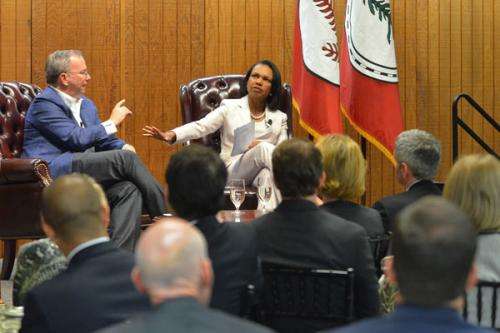Google CEO Eric Schmidt and political science Professor Condoleezza Rice discuss threats to cybersecurity during Stanford's boot camp for congressional staffers. Credit: Rod Searcey
Congressional staffers from both sides of the aisle came to Stanford last week for a cybersecurity boot camp. They heard from Google's Eric Schmidt that security problems are serious, but can be reduced with better encryption of communications.
In the early years of communicating by computer, nobody worried about electronic interlopers sniffing through private files, Google executive chairman Eric Schmidt told a gathering of key congressional staffers on the Stanford campus.
But that has changed in a big way – witness Chinese hackers and the National Security Agency. In the end, Schmidt said, technology, rather than law, is more likely to reinstate privacy: "Everything is going to have to be encrypted all the way."
The software engineer, who joined Google in 2001, spoke in a conversation with Condoleezza Rice, the former U.S. secretary of state who is now a Stanford professor of political science and a senior fellow at the Hoover Institution.
"I come here because this is where all the innovation in the country seems to start," Schmidt said. He noted that Stanford researchers have, in fact, played a historical role in the development of encryption.
Looking for good news? Schmidt predicted unbreakable end-to-end encryption "within our lifetime." Google now offers encrypted email, and Yahoo is following.
The three-day workshop was cosponsored by Stanford's Center for International Security and Cooperation and the Hoover Institution. The boot camp was led by Amy Zegart, the co-director of CISAC and a senior fellow at Hoover, and Herb Lin, a CISAC consulting scholar and chief scientist at the Computer Science and Telecommunications Board, National Research Council of the National Academies.
Schmidt, in response to a question from Rice about classes students should take, noted that 75 percent of Stanford students take at least one computer science course. He talked about the importance of data science – a topic Google scientists know well. He pointed out that President Obama's campaign organization made good use of data science.
Voice recognition, text recognition and face recognition by cameras and computers have become very good, but pose a privacy threat, Schmidt said. Placing cameras everywhere would drastically reduce crime, he said, but at the cost of privacy.
On a different topic, Schmidt said Google has been working hard to create a virtual personal assistant that would know its user very well, could take care of business and even offer advice. "I want a program that answers all my email," Schmidt said.
Schmidt's conversation with Rice was part of Stanford's inaugural weeklong cybersecurity boot camp for key congressional staffers who deal with cybersecurity issues.
The participants, from both sides of the political aisle, earlier heard from, among others, Jane Holl Lute, a former deputy secretary of homeland security, the current president of the Council on CyberSecurity and a consulting professor at Stanford's Center for International Security and Cooperation. "Nothing you do online is secure," she warned. Schmidt touched on a similar topic. Government computers are typically out of date and vulnerable to attack, he said. Even something as simple as a software update would be an improvement, he said.
Stanford President John Hennessy and Larry Kramer, former dean of Stanford Law School and now president of the William and Flora Hewlett Foundation, held a keynote conversation for the congressional staffers during lunch on Tuesday.
Hennessy asked Kramer about the foundation's new $20 million initiative on cyberthreats against the government, businesses and individuals and why he believes cybersecurity is such an important issue.
"The gap we found is that there is very little work being done in terms of long-term public policy analysis, " Kramer said. "Government and industry – we're plunging ahead dealing with the problems that are right in front of us – but nobody is really thinking about a long-term government framework to make this work."
Provided by Stanford University



















